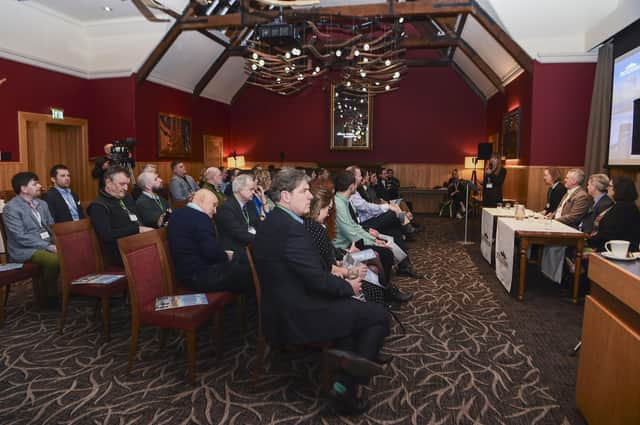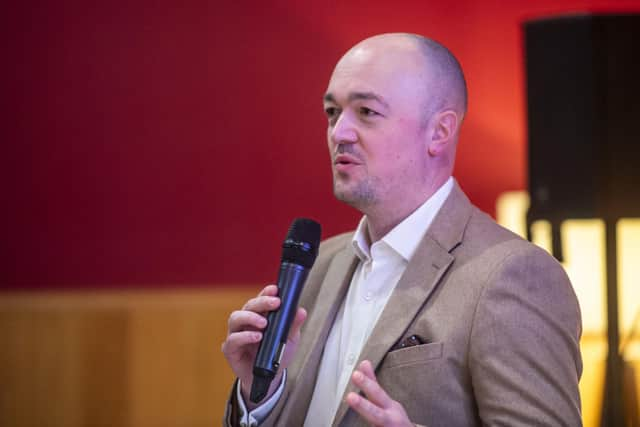Whisky Forum: Safeguarding Scotch whisky for the years to come


The event, which was held at the Scotch Whisky Experience in Edinburgh and organised by The Scotsman in association with E.ON, included a panel session at which experts discussed sustainability and what the future of the whisky industry might look like.
Bearing in mind its commitment to the net-zero target, the industry is making strides to reduce its carbon footprint and become greener. It is, however, still expanding, with more new distilleries opening, and “lost” or “ghost” distilleries being reopened. The question of how this can be squared with the race to net-zero was central to the meeting.
Advertisement
Hide AdAdvertisement
Hide AdThis was something that Littlejohn, director of strategy and communications at the Scotch Whisky Association (SWA), touched on as part of his opening speech, which explained how the whisky industry has always been forward thinking.


He told the audience: “This year marks 530 years since the spiritual beginnings of the industry – the famous Exchequer rolls. As an industry more than five centuries in the making, it is not surprising that one eye is always on the future and taking the next stride forward. But how did we go from the eight bottles of malt 530 years ago to an industry which exports 43 bottles every second?”
After touching on the globalisation of Scotch in the early 19th Century, Littlejohn addressed whisky exports and challenges from these markets, saying: “Today, the global reach of the industry remains the cornerstone to the future of the industry. But the market has – of course – shifted over the last 200 years and is more competitive, more crowded, and more complex than it has ever been.
“Take China, for example. Just 20 years ago, direct exports of Scotch whisky to China were valued at just£2 million. Last year, exports were valued at £200m.
“More consumers in mega-markets like China and India are undoubtedly a good thing for business. They play a key role in futureproofing Scotch whisky. And it’s having that premium product – desired by millions around theworld – which is at the heart of having a sustainable industry in the future.”


While this growth is good, Littlejohn spoke of the drain on precious resources it could have – water, wood and copper to name a few key ones – and how we need to safeguard them.
He also talked about time, saying: “We are now just a 21-year-old single malt away from the Scottish Government’s 2045 net-zero ambition. There will be a spirit being left to mature in casks today which, when bottled, will enter the market in a new net-zero world. In whisky time, that is just a few ticks of the clock.”
After this speech, the panel discussion started, chaired by Rosemary Gallagher of The Scotsman. The panel comprised James Cottrill, director of B2B sales for E.ON; Ruth Piggin, industry sustainability director at SWA; Ronald Daalmans, environmental sustainability manager at Chivas Brothers and Dawn Maskell, director of the International Centre for Brewing and Distilling at Heriot-Watt University.
Advertisement
Hide AdAdvertisement
Hide AdRuth Piggin, whose job is central to the main points of the night, explained more of her work at the SWA, saying: “My job is focused on driving forward our sustainability strategy. It looks at all our work programmes, it keeps us looking at evidence-based strategies, and it also is about testing and quantifying the projects that we want to do as an industry together, and facilitating collaboration, which is also really critical.”
When asked why sustainability and the environment are so important, Maskell replied: “It’s not just important to Scotch whisky. It should be important to us all. It needs to be embedded in everything we’re doing from now onwards, because if we don’t we won’t have anybody to sell whisky to, nobody to drink it, and will have nobody tomake it.”
Ronald Daalmans added: “We’re relying on Scotland’s natural resources that will be limited, yet we’re a growing sector. So we need to be able to show that we’re expanding responsibly. We keep adding water and trying to take it out again, so we’re an energy intensive process. How we are going to contribute to Scotland’s decarbonisation is really, really important.”
Last year, Chivas Brothers made its carbon-cutting technology (MVR) open source, which Daalmans discussed, a move that underlined intra-industry collaboration.
Water was also a big topic on the night, with Daalmans explaining that Pernod Ricard – of which Chivas Brothers is part – has a group-wide challenge to improve its water efficiency by 20 per cent by 2030. This is part of a wider collaboration with the industry in terms of water stewardship.
James Cottrill discussed the role E.ON could take in helping the industry meet net-zero, saying: “What we want to do is forge long-term partnerships, and deliver the solutions that it needs to ultimately get to net-zero and deliver the sustainability projects. We’ve worked with Diageo recently and installed a solar farm on one of their sites.”
He also discussed E.ON’s work with heat pumps: “One of the big things is the decarbonisation of heat and the electrification of heat. We’ve been developing very specific heat pump solutions, which provide both cooling and heating at high temperatures.”
Packaging, future tech, and diversification of the industry were also adressed, with Maskell observing that the gender balance of students at Heriot-Watt studying brewing and distilling is worse than it was in the 90s. When asked why, she said: “There’s various thoughts as to why. Is it the perception of the craft industry by young people as [being] all white men with beards and it’s not for anyone else? I’d like to think once they get to us that they see reasonable representation and gender balance amongst our academic staff.”
Advertisement
Hide AdAdvertisement
Hide AdWhile it won’t be an easy few years, and changes need to be made across all industries and our daily lives, the whisky sector is forging a path forward to a green future, thanks to collaboration, new technology, an ongoing conversation about the environment, and a focus on bringing in new talent.
Voices: Julie Trevisan-Hunter, Scotch Whisky Experience
The evening kicked off with a welcome from hosts the Scotch Whisky Experience. Julie Trevisan-Hunter, its marketing director, reiterated the organisation’s purpose – to make the world fall in love with Scotch whisky.
She said: “That’s what we do, year-in, year-out, and have done for almost four decades now.
“Last year, we welcomed over 400,000 people throughour doors from all over the world, who all left feeling more inspired, more connected, more educated, and certainly more passionate about Scotch whisky.”
Voices: Graeme Littlejohn, Scottish Whisky Association
As well as mentioning the Budget and government involvement, Graeme Littlejohn, the Scottish Whisky Association’s director of strategy and communications, also spoke about how the sector is becoming increasingly diverse.
He said: “There is no sustainable future for Scotch whisky, if we collectively have not stepped away from the abyss of climate change.
“It is equally self-evident that there’s no future for whisky if we don’t have the workforce to produce our national spirits or well-regulated markets to sell it to.”